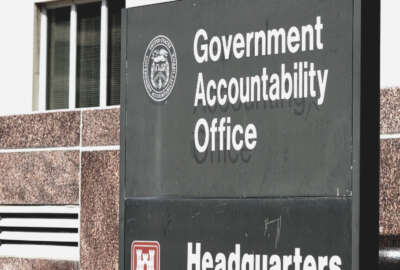To listen to the Federal Newscast on your phone or mobile device, subscribe in PodcastOne or Apple Podcasts. The best listening experience on desktop can be found using Chrome, Firefox or Safari.
- Federal building alarm systems and security cameras are falling short of expectations. But just how short? Well that’s unclear from a heavily redacted report released by the General Services Administration inspector general this week. Auditors reviewed the security systems and cameras at 14 federal buildings and seemed to find they were in various states of disrepair. One of the IG’s recommendations is for GSA to implement a plan to repair, replace and even install security cameras and alarm systems as part of a nationwide assessment. The IG also says GSA and the Federal Protective Service should revise their memorandum of understanding to clearly identify who’s responsible for maintaining these systems.
- The Government Accountability Office found $206 billion of waste in government spending on personal property like office chairs and cars between 2016 to 2020. GAO found agencies use only 8% of the over 2.6 million excess items. Recommendations include promoting the maximum use out of excess property and advising agencies to review their internal guidance on considering excess property. Tuesday’s report comes two weeks after Comptroller General Gene Dodaro addressed the Senate with ways to limit government overlap earlier this month.
- USPTO is investing in a foundational piece of its zero trust architecture. With what may be the first of its kind in the federal sector, the U.S. Patent and Trademark Office is going all in on SASE or secure access service edge. Jamie Holcombe is the CIO at USPTO and he explains why this is the first foundational piece of the zero trust architecture that they can act upon. “I like SASE as that architectural philosophy so to ensure that we can identify users and devices, and apply the policy-based security controls delivering that secure access to the applications and ensuring that our data is secure.” (Federal News Network)
- Agencies need to prepare for a big change to a widely used email and collaboration service. Microsoft will start disabling Basic Authentication for Exchange Online starting on Oct. 1, and the Cybersecurity and Infrastructure Security Agency is making sure agencies are ready. In new guidance, CISA laid out steps agencies should take to determine to what extent they still rely on basic authentication, if they haven’t already. Microsoft announced the Oct. 1 deadline last year. The company says Basic Authentication is one of the most common ways its customers are compromised, and its shifting to methods that support multifactor authentication.
- The Social Security Administration is looking to replace its current system for managing public records requests. SSA is among the agencies phasing out the FOIA online case management solution. In a request for information, SSA says the new system should allow its FOIA analysts to communicate directly with public requesters. It also should be compatible with an electronic payment system, like Pay.gov. SSA is looking for responses by July 6.
- The Biden administration wants to hear your ideas about sustainability. At the first Federal Sustainability Solutions forum, Federal Chief Sustainability Officer Andrew Mayock asked all federal workers and contractors to share their journeys and experiences with sustainability during their careers in the public, private or nonprofit sectors. Mayock said the government needs to learn from, and copy, the successes achieved in the private sector, whose efforts surpassed those of the government during the last few years, to combat climate change while customizing the ideas to scale across the government.
- The Department of Veterans Affairs adopted Login.gov to improve online customer experience to veterans. With Login.gov veterans can now use the same username and password to access VA.gov, My Health-E-Vet and VA’s Health and Benefits mobile. The service also allows veterans to use the same credentials to access services across multiple federal agencies, including the the Office of Personnel Management and the Small Business Administration. VA’s adoption of Login.gov meets a key goal of the Biden’s administration’s executive order on improving customer experience.
- The agency in charge of the Thrift Savings Plan is trying to keep up with high call volumes to customer service. Another 100 staff members are likely heading to TSP’s customer service center. The TSP board has so far added 320 representatives, now up to a total of 800 employees. That’s a 66% increase to the agency’s call center — and a record high for the board. The staff increase is an effort to alleviate unprecedented delays and hold times after a major TSP update on June 1. (Federal News Network)
- Agencies get an extension for hiring temporary employees in response to the COVID-19 pandemic. The Office of Personnel Management says agencies can continue to use a special hiring authority to add short-term staff, through March 1, 2023. OPM says agencies have an ongoing need to hire short-term workers, to meet both their missions and responsibilities related to the pandemic. Agencies may continue to fill positions on a temporary basis for up to one year. They can also extend the appointments for an additional year if needed.
- Sean O’Donnell has been serving as the Pentagon’s acting inspector general for more than two years. But the Government Accountability Office says he hasn’t had the authority to serve in the position since last November, and his initial appointment also violated federal law. GAO’s findings are based on its own, new, interpretation of the Federal Vacancies Reform Act, a law designed to limit how long acting officials can serve in Senate-confirmed positions. DoD’s OIG says it’s still reviewing the opinion. DoD hasn’t had a Senate-confirmed inspector general since 2016. (Federal News Network)
- The Defense Department and Air Force are teaming up with Historically Black Colleges and Universities to create a new research center. The military’s 15th academic research center will focus on tactical autonomy, helping the Defense Department develop technologies that involve independent computer systems. The Air Force is committing $12 million a year for five years to the center. DoD will add another $2 million a year. The organization will be a consortium of Historically Black Colleges and Universities, furthering DoD’s push for diversity and inclusion. The Pentagon hopes to use the center to help the schools build out their research capacities and recruit a more diverse workforce. (Federal News Network)
- The Joint Staff approves the military’s first-ever accredited space exercise. The Space Force’s SPACE FLAG exercise joins other approved exercises like the Air Force’s RED FLAG and the Navy’s Fleet Synthetic Training as programs providing capability to provide realistic environments in a joint context. In total there are 37 accredited joint training programs.
- The Supreme Court denies a petition from the National Postal Policy Council to review a federal appeals court’s ruling from last year. U.S. Court of Appeals for the D.C. Circuit found last November that the Postal Regulatory Commission (PRC) struck a careful balance when it allowed USPS to set mail rates higher than the pace of inflation. The commission, however, is reexamining its decision to grant greater pricing flexibility to USPS under a provision of the fiscal 2022 omnibus spending bill. (Federal News Network)
Copyright
© 2024 Federal News Network. All rights reserved. This website is not intended for users located within the European Economic Area.





